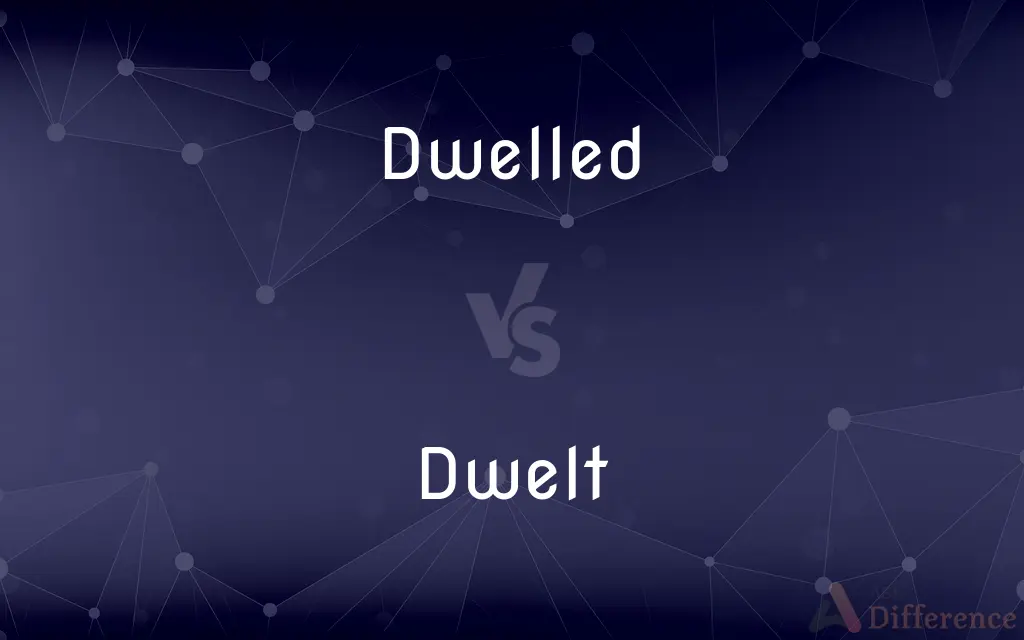Dwelled vs. Dwelt — What's the Difference?
By Fiza Rafique & Maham Liaqat — Updated on April 6, 2024
Dwelled focuses on a prolonged stay or consideration, highlighting duration; whereas dwelt, its past tense counterpart, often carries an archaic or formal tone, implying residence or contemplation.

Difference Between Dwelled and Dwelt
Table of Contents
ADVERTISEMENT
Key Differences
Dwelled often refers to spending a considerable amount of time in a place or on a thought, emphasizing the action's duration. On the other hand, dwelt serves as the simple past and past participle form of "dwell," commonly used in formal or literary contexts to denote living in a place or pondering over something.
When someone uses "dwelled," it typically signifies a current or ongoing action that has been prolonged over time, suggesting a continuous aspect. Whereas "dwelt" implies an action completed in the past, giving it a sense of finality or historical reference.
The choice between "dwelled" and "dwelt" can also reflect the speaker's or writer's stylistic preference. Dwelled might appear more in modern, conversational English, while dwelt is often found in historical, biblical, or poetic writings.
The usage of "dwelled" can subtly indicate an emphasis on the process or experience of living or considering, suggesting a deeper engagement or focus. In contrast, "dwelt" might evoke a more nostalgic or reflective tone, hinting at a bygone era or a concluded period of contemplation.
Despite their differences, both "dwelled" and "dwelt" connect deeply with the concept of habitation or reflection. Each term, through its use and context, enriches the narrative or discourse by layering temporal, stylistic, and emotional nuances.
ADVERTISEMENT
Comparison Chart
Usage
More common in modern contexts.
Often found in formal or literary texts.
Connotation
Implies an ongoing or recent action.
Suggests a past action or contemplation.
Tone
Can be neutral or descriptive.
Carries an archaic or nostalgic tone.
Temporal Aspect
Indicates a prolonged duration.
Implies completion in the past.
Stylistic Preference
Preferred in conversational English.
Favored in historical or poetic writings.
Compare with Definitions
Dwelled
To exist in a specified state.
They dwelled in happiness.
Dwelt
Pondered or considered deeply (past tense).
She dwelt on the decision for weeks.
Dwelled
To think, speak, or write at length about a topic.
He dwelled on the subject for hours.
Dwelt
Lived in a specific place or condition (past tense).
He dwelt among the villagers for years.
Dwelled
To live in a place or state for a period.
She dwelled in the countryside for most of her life.
Dwelt
Occupied a place as a spirit or entity (past tense).
It was believed that spirits dwelt within the sacred grove.
Dwelled
To reside as a spirit.
Legends say that ghosts dwelled in that abandoned house.
Dwelt
Existed in a particular state or condition (past tense).
They once dwelt in peace.
Dwelled
To linger over a thought or subject.
She often dwelled on the past.
Dwelt
Stayed in a particular place or condition (past tense).
The artist dwelt in obscurity before his discovery.
Dwelled
To live as a resident; reside.
Dwelt
A past tense and a past participle of dwell.
Dwelled
To exist in a given place or state
Dwell in joy.
Dwelt
Simple past tense and past participle of dwell
Dwelled
To fasten one's attention on something, especially moodily or persistently
Kept dwelling on what went wrong.
Dwelt
Of Dwell.
Dwelled
To speak or write at length; expatiate
Dwelt on the need to trim the budget.
Dwelled
(mostly US) dwell
Common Curiosities
Can "dwelled" and "dwelt" both refer to physical and mental states?
Yes, both can refer to residing in a physical place or spending time contemplating something.
Is "dwelt" considered archaic?
"Dwelt" is not necessarily archaic, but it is more commonly found in formal or literary contexts.
What does "dwelt" mean?
"Dwelt" is the past tense of "dwell," indicating that someone lived or pondered over something in the past.
Can "dwelled" imply a negative focus?
Yes, "dwelled" can imply a negative focus if used to describe lingering on unpleasant thoughts or experiences.
Are there any synonyms for "dwelled" and "dwelt"?
Synonyms include "lived," "resided," "stayed," "pondered," and "contemplated," depending on the context.
What does "dwelled" mean?
"Dwelled" refers to living in a place or focusing thought on a subject for a period.
Is "dwelled" used in legal or formal documents?
It can be, but "resided" is more typical in formal legal contexts.
Are "dwelled" and "dwelt" interchangeable?
While they can be used interchangeably in some contexts, "dwelt" often carries a more formal or historical tone.
Does the preference for "dwelled" over "dwelt" vary by region?
Yes, usage can vary by region and dialect, with "dwelled" being more common in American English.
How do "dwelled" and "dwelt" relate to the concept of time?
"Dwelled" often indicates an ongoing or prolonged action, while "dwelt" refers to a completed action in the past.
How does the use of "dwelled" or "dwelt" affect the tone of writing?
"Dwelled" tends to be neutral or descriptive, while "dwelt" can add a formal, historical, or nostalgic tone.
Which is more common in everyday language, "dwelled" or "dwelt"?
"Dwelled" is more common in conversational English, while "dwelt" is more likely found in written or formal speech.
Does "dwelt" always imply past residency?
Yes, "dwelt" specifically refers to past residency or consideration.
Can "dwelt" be used in contemporary narratives?
Yes, "dwelt" can be used effectively in contemporary narratives, especially to evoke a timeless or reflective ambiance.
Can "dwelled" be used figuratively?
Yes, "dwelled" can be used figuratively to describe lingering over thoughts or emotions.
Share Your Discovery

Previous Comparison
Peloton vs. Peleton
Next Comparison
England vs. WalesAuthor Spotlight
Written by
Fiza RafiqueFiza Rafique is a skilled content writer at AskDifference.com, where she meticulously refines and enhances written pieces. Drawing from her vast editorial expertise, Fiza ensures clarity, accuracy, and precision in every article. Passionate about language, she continually seeks to elevate the quality of content for readers worldwide.
Co-written by
Maham Liaqat













































